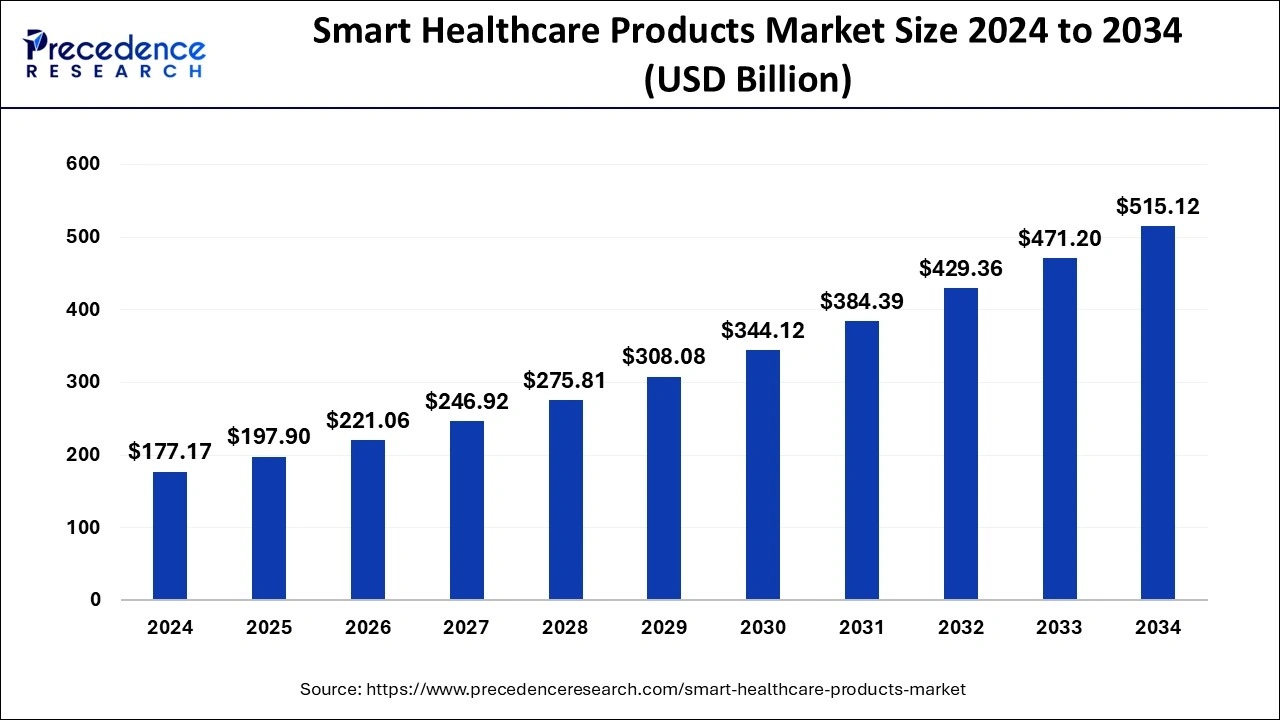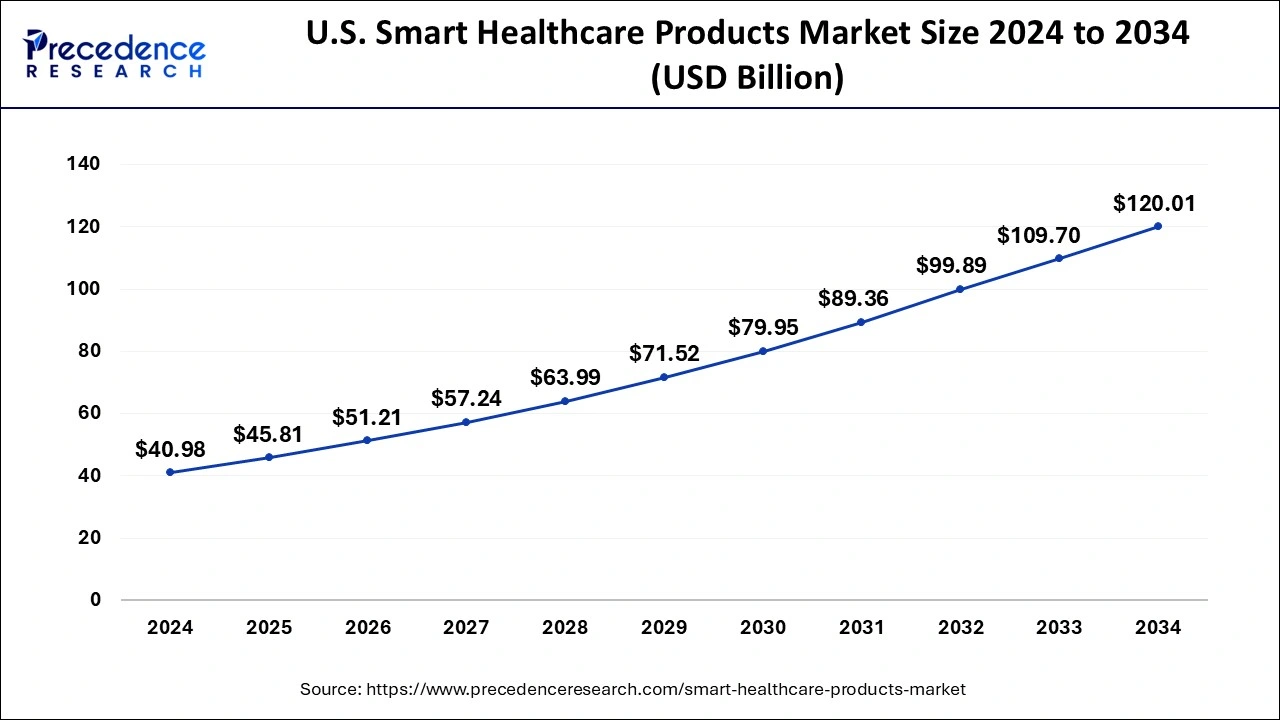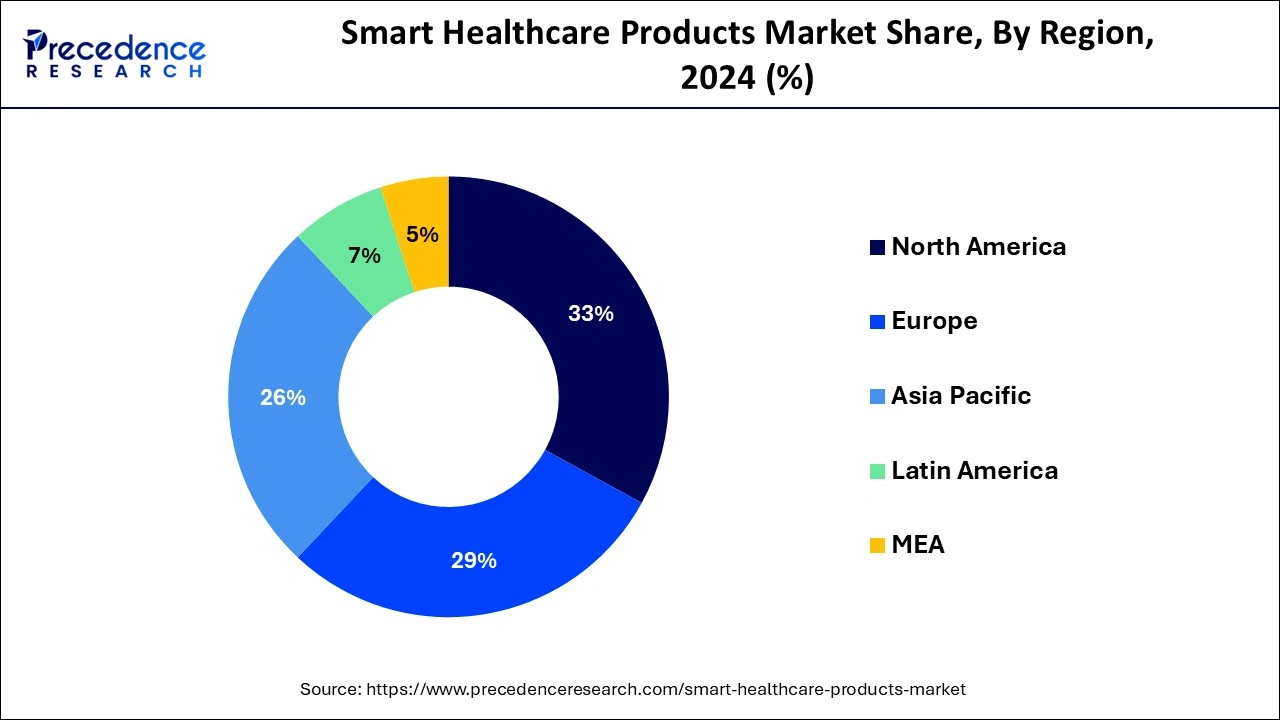Smart Healthcare Products Market Size and Forecast 2025 to 2024
The global smart healthcare products market size accounted for USD 177.17 billion in 2024 and is predicted to reach around USD 515.12 billion by 2034, growing at a CAGR of 11.26% from 2025 to 2034.

Smart Healthcare Products Market Key Takeaways
- North America dominated the market with the highest market share of 33% in 2024.
- Asia Pacific is observed to witness the fastest rate of growth during the forecast period.
- By Product, the wearable biosensors segment dominated the market in 2024.
- By Distribution Channel, the pharmacy stores segment dominated the global smart healthcare products market in 2024.
U.S. Smart Healthcare Products Market Size and Growth 2025 to 2034
The U.S. smart healthcare market size was valued at USD 40.98 billion in 2024 and is estimated to reach around USD 120.01 billion by 2034, growing at a CAGR of 11.34% from 2025 to 2034.

The study report covers key trends and prospects of smart healthcare products across different geographical regions including North America, Europe, Asia-Pacific, Latin America, Middle East, and Africa. Geographically, smart healthcare products market is conquered by North America owing to speedy technological progress in healthcare products and the presence of major companies operating in the target market. Asia Pacific smart healthcare products industry market is estimated to grow at noteworthy growth rate in the next 10 years. The growth is attributed to and risinghome healthcaremonitoring tendency, coupled with increasing geriatric population in the countries of APAC owing to changing lifestyle which is creating demand for the smart healthcare products. Additionally, budding demand for the smart healthcare products for the end users in LATAM and the countries of Middle East and Africa is anticipated to propel industry growth in the next 10 years.

Smart Healthcare Products Market Growth Factors
- Rising adoption of mHealth
- Supportive government programs
- Rapid improvements in healthcare IT
Future of Global Smart Healthcare Products Market
Through using advanced sensors and computer communication technology, the Internet of Things revolution has already caught up with the global demand for smart healthcare products and is producing a wide variety of applications on the market. The launch of the new IoT technologies enables healthcare hardware and medical equipment manufacturers to generate and store medical records at rates much faster than ever.
Market Trends
Telemedicine Expansion: The increased adoption of telemedicine rising adoption of smart healthcare products. The COVID-19 pandemic has been significant in drawing a shift in healthcare toward telemedicine. Government support and investments in digital healthcare services are further fostering the popularity of telemedicine.
Government initiatives, including Omar Abdullah's 2025 budget, are aiming to strengthen telemedicine infrastructure and provide universal health insurance to bridge the urban-rural healthcare divide.
Adoption of Digital Healthcare: The rapid digitalization in the healthcare sector is driving the adoption of digital healthcare services. Major market players are investing in innovation and the development of advanced digital healthcare products and services.
Demand for Personalized Medicines: The surge in smart healthcare products has been fostered due to increased demand for personalized medicines. The rising incidence of chronic and rare diseases is making it essential for the adopt of personalized care for individuals.
Healthcare and AI Entry: AI is becoming a significant tool for the healthcare industry to facilitate overall applications, solutions, and services in the sector. AI has become a primary preference for diagnosis, treatment planning, and drug discovery, driving emphasis on the adoption of smart healthcare products.
- In January 2025, AI-enabled CT 5300 was launched by Royal Philips, a global leader in health technology, at the 23rd Asian Oceanian Congress of Radiology (AOCR) 2025.
Scope of the Smart Healthcare Products Market
| Report Highlights | Details |
| Market Size in 2024 | USD 177.17 Billion |
| Market Size in 2025 | USD 197.9 Billion |
| Market Size by 2034 | USD 515.12 Billion |
| Growth Rate From 2025 to 2034 | CAGR of 11.26% |
| Base Year | 2024 |
| Forecast Period | 2025 to 2034 |
| Largest Market | North America |
| Segments Covered | Product, End User, Distribution Channel, and Region |
| Regional Scope | North America, Europe, Asia Pacific, Latin America, Middle East & Africa (MEA) |
Segment Analysis
The Wearable Biosensors Segment Is Projected To Dominate the Product Type Segment of Smart Healthcare Products Market Revenue
On the basis of product type wearable biosensors segment is dominant owing to its increased adoption by the end-users worldwide. Wearable activity trackers product type segment is expected to hold share more than 20% in global smart healthcare products market
Pharmacy Stores Distribution Channel Is Predictable To Take over the Distribution Channel Segment of Smart Healthcare Products Market Revenue
On the basis of distribution channel the global market is segmented into major type's pharmacy stores, e-commerce, and others. The pharmacy stores segment is leading with major share in terms of revenue. The e-commerce segment is anticipated to grow at significant CAGR over the forecast period owing to increased penetration of internet across the globe.
Key Market Insights
The Internet-of-Things has engaged with business spectrum along with its applications including healthcare. Smart healthcare products market is projected to grow at considerable rate due to penetration of internet worldwide. The traditional doctor and patient appointment has lost its productivity with the ever-increasing world population. Smart healthcare is now becoming very critical. Smart healthcare can be incorporated at all stages, ranging from baby temperature tracking to elderly monitoring of vital signs. In general, connected health refers to any digital healthcare solution that can work remotely and is a collective term for subsets such astelemedicineandmobile health, but with an additional aspect of continuous health monitoring, emergency detection and automatic alerting of appropriate individuals.
Smart Healthcare Products Market Companies
- Medtronic, Inc.
- eClinicalWorks
- Olympus Corporation
- Terumo Corporation
- Becton, Dickinson & Company
- Cerner Corporation
- Stanley Healthcare
- Honeywell Life Care Solutions
- Allscripts Healthcare Solutions, Inc.
- AirStrip Technologies, Inc.
For the better understanding the recent situation of the global smart healthcare products market and for most policies of the country, Precedence Research forecast the future evolution of the smart healthcare products industry. This research study offers qualitative and measureable insights on smart healthcare products market and valuation of market size and development trends for global market segments.
Recent Developments
- In April 2025, Motivity, a leader in clinical SaaS solutions for Applied Behavior Analysis (ABA) providers, announced the expansion of the Motivity platform, to include a complete all-in-one, enterprise-ready practice management system, implementing the experience, expertise, and proven track record from the industry veterans at Humane Business Intelligence Technology Solutions (hBITS).
- In April 2025, Teladoc Health launched its next-generation Cardiometabolic Health Program to improve population health by preventing the progression of diabetes, hypertension, and obesity. The new features of this program aim to help patients manage these conditions through virtual care.
- In July 2024, Fabric launched its subscription-based care model, which provides consumer-grade convenience and continuity to healthcare organizations. The mobile capability for this model was introduced in October 2024.
- In 2020, Allscripts increased its engagement with its largest client, Northwell Health, which is the largest health system in New York.
- In 2020 A New Spinal Cord Stimulation Therapy, Medtronic Acquired Stimgenics, Pioneer of DTM.
Segments Covered in the Report
By Product
- ECG Wearable Devices
- Wearable Activity Trackers
- Wearable Biosensor
- Others
By Distribution Channel
- Pharmacy Stores
- E-commerce
- Others
By End User
- Diabetes Patient
- Heart Disease Patients
- Chronic Renal Failure Patients
- Others
By Geography
- North America
- Europe
- Asia Pacific
- Latin America
- Middle East and Africa
For inquiries regarding discounts, bulk purchases, or customization requests, please contact us at sales@precedenceresearch.com
Frequently Asked Questions
Ask For Sample
No cookie-cutter, only authentic analysis – take the 1st step to become a Precedence Research client
 Get a Sample
Get a Sample
 Table Of Content
Table Of Content
 sales@precedenceresearch.com
sales@precedenceresearch.com
 +1 804-441-9344
+1 804-441-9344
 Schedule a Meeting
Schedule a Meeting